- Home
- Clair W. Hayes
Boy Allies with the Victorious Fleets; Or, The Fall of the German Navy Page 2
Boy Allies with the Victorious Fleets; Or, The Fall of the German Navy Read online
Page 2
CHAPTER II
THE BOY CAPTAIN AND HIS LIEUTENANT
The U.S.S. Plymouth was Jack Templeton's first command. He had beenelevated to the rank of captain only a few weeks before. Naturally he wasnot a little proud of his vessel. When Jack was given his ship, it wasonly natural, too, that Frank Chadwick, who had been his associate andchum through all the days of the great war, should become Jack's firstofficer.
In spite of the fact that Jack's rating as captain was in the Britishnavy, he was at this moment in command of an American vessel. This cameabout through a queer combination of circumstances.
The American commander of the Plymouth had been taken suddenly ill. Atalmost the same time the Plymouth had been ordered to proceed from Doverto Liverpool to join other American vessels. Almost on the eve ofdeparture, the first officer also was taken ill. It was to him the commandnaturally would have fallen in the captain's absence. The second officerwas on leave of absence. Thus, without a skipper, the Plymouth could nothave sailed.
Jack and Frank had recently returned with a British convoy from America.They were in Dover at the time. From his sick bed in a hospital, thecaptain of the Plymouth had appealed to the British naval authorities. Inspite of the fact that he was in no condition to leave when he receivedhis orders, he did not wish to deny his crew the privilege of seeingactive service, which the call to Liverpool, he knew, meant.
The captain's appeal had been turned over to Lord Hastings, now connectedprominently with the British admiralty. Lord Hastings, in the early daysof the war, had been the commander under whom Jack and Frank had served.In fact, the lads were visiting the temporary quarters of Lord Hastings inDover when the appeal was received from the commander of the Plymouth.
"How would you like to tackle this job, Jack?" Lord Hastings asked.
"I'd like it," the lad replied, "if you think I can do it, sir."
"Of course you can do it," was Lord Hastings' prompt reply. "I haven'tsailed with you almost four years for nothing."
"You mean, sir," replied Jack with a smile, "that I haven't sailed withyou that long for nothing."
"That's more like it, Jack," put in Frank laughingly. "I've learned a fewthings from Lord Hastings myself."
"It is hardly probable," continued Lord Hastings, "that your promotion hasbeen unearned, Jack. No, I believe you can fill the bill."
"In that case, I shall be glad to take command of the Plymouthtemporarily, sir."
"And how about me?" Frank wanted to know. "Where do I come in, sir?"
"Why," said Lord Hastings, "I have no doubt it can be arranged so you cango along as first officer. I understand the first officer of the Plymouthis also under the weather."
"But isn't all this a bit irregular, sir?" Jack asked.
"Very much so," was Lord Hastings' reply. "At the same time, manyprecedents are being broken every day, and I can see no reason why twoBritish officers cannot lend their services to an ally if they are askedto do so."
"It is a little different with me, sir," said Frank. I'm an American."
"All the same," said Lord Hastings, "you're a British naval officer, nomatter what your nativity."
"That's true, too, sir," Frank agreed. "I haven't thought of it in justthat way."
"Well," said Lord Hastings, "I shall report then that Captain Templetonand First Lieutenant Chadwick will go aboard the Plymouth this evening."
"Very well, sir," said Jack.
This is the reason then that Jack and Frank found themselves aboard anAmerican destroyer in the Irish sea.
Frank Chadwick, as we have seen, was an American. He had been in Italywith his father when the great war began. He had been shanghaied in Naplessoon after Germany's declaration of war on France. When he came to hissenses he found that his captors were a band of mutinous sailors. Aboardthe vessel he found a second prisoner, who turned out to be a member ofthe British secret service.
Frank met Jack Templeton, a British youth, aboard the schooner. Jack cameaboard in a peculiar way.
The schooner, in control of the mutineers, had put into a north Africanport for provisions. Now it chanced that the store where the mutineerssought to buy provisions was conducted by Jack. The lad was absent whenthe supplies were purchased and returned a few moments later to find thatthe mutineers had departed without making payment.
Jack's anger bubbled over. He put off for the schooner in a small boat.Aboard, the chief of the mutineers refused the demand for payment. A fightensued. Jack, facing heavy odds, sought refuge in the hold of the vessel,where he was made a prisoner.
During the night Jack was able to force his way from the hold into thecabin where Frank and the British secret service agent were held captives.He released them, and joining forces, the three were able to overcome themutineers and make themselves masters of the ship.
Now Jack Templeton was an experienced seaman and knew more than therudiments of navigation. Under his direction the schooner returned to thelittle African port that he called home. There the three erstwhileprisoners left the ship to the mutineers.
Later, through the good offices of the British secret service, Frank andJack made the acquaintance of Lord Hastings, also in the diplomaticservice. They were able to render some service to the latter and lateraccompanied him to his home in London. There, at their request, LordHastings, who in the meantime had been given command of a ship of war, hadthem attached to his ship with the rank of midshipmen.
Both Jack and Frank had risen swiftly in the British service. They hadseen active service in all quarters of the globe and had fought under manyflags.
Under Lord Hastings' command they had been with the British fleet in theNorth Sea when it struck the first decisive blow against the Germans justoff Helgoland. Later they were found under the Tricolor of France and withthe Italians in the Adriatic. With the British fleet again when it salliedforth to clear the seven seas of enemy vessels, they had traversed theAtlantic, the Pacific and the Indian oceans. It had been their fortune,too, to see considerable land fighting. They had been with theAnglo-Japanese forces in the east and had conducted raiding parties insome of the German colonial possessions.
Several times they had successfully run the blockade in the Kiel canal,passing through the narrow straits in submarines just out of reach of thefoe. In Russia, they had, early in the war, lent invaluable assistance tothe Czar; and more lately, they had been in the eastern monarchy when CzarNicholas had been forced to renounce his throne.
Once since the war began they had been to America. This was shortly afterthe United States entered the war. They were ordered to the North Atlanticin order to help the American authorities snare a German commerce raiderwhich, in some unaccountable manner, had run the British blockade in theNorth sea, and was wreaking havoc with allied shipping. Later they went toNew York, and then returned to Europe with a combined British-Americanconvoy for the first expeditionary force to cross the seas.
In temperament and disposition Jack and Frank were as unlike as one couldconceive. Jack, big for his age, broad-shouldered and strong, was alwayscool and collected. Frank, on the other hand, was of a more fiery nature,easily angered and often rash and reckless. Jack's steadying influence hadoften kept the two out of trouble, or brought them through safely whenthey were in difficulties.
Both lads spoke French and German fluently and each had a smattering ofItalian. Also, as the result of several trips to Russia, they had a fewwords of the Russian tongue at their command.
In physical strength, Jack excelled Frank by far, although the latter wasby no means a weakling. On the other hand again, Frank was a crack shotwith either rifle or revolver; in fact, he was such an excellent marksmanas to cause his chum no little degree of envy. Then, too, both lads wereproficient in the art of self defense and both had learned to hold theirown with the sword.
Up to the time this story opens the combined allied fleets had succeededin keeping the Germans bottled up in the strong fortress of Helgoland.True, the enemy several times had sallied for
th in few numbers, apparentlyseeking to run the blockade in an effort to prey upon allied merchantships. But every time they had offered battle they had received the worstof it. They had been staggered with a terrible defeat at Jutland almost ayear before this story opens, and since that time had not ventured forth.
But even now, in the security of their hiding places, the Germans weremeditating a bold stroke. Submarines were being coaled and victualed inpreparation for a dash across the Atlantic. Already, one enemysubmarine--a merchantman--had passed the allied ships blocking the Englishchannel and had crossed to America and returned. Some months later, aU-Boat of the war type had followed suit. A cordon of ally ships had beenthrown around American ports to snare this venturesome submarine on itsreturn, but it had eluded them and returned safely to its home port.
But soon--very soon, indeed--German undersea craft were to strike a moresevere blow at allied shipping, carrying, for the moment, the war in allits horrors to the very door of America. While the United States wasarming and equipping its millions to send across the sea to destroy thekaiser and German militarism, these enemy undersea craft were crossing theAtlantic determined to reap a rich harvest upon American, allied andneutral shipping off the American coast.
And the blow was to be delivered without warning--almost.
When the U.S.S. Plymouth, under Jack's command, returned to Liverpool, thecaptain of the vessel, having somewhat recovered, came aboard and relievedJack of command.
"I'm obliged for your services, Captain," he said, "but I'll take chargeof the old scow again myself, with your leave."
Jack and Frank went ashore, where, at their hotel, they received a brieftelegram from Lord Hastings. It read as follows:
"Return to Dover at once. Important."
"Now I wonder what is up," said Frank after reading the message.
"The simplest way to find out," replied Jack, "is to go and see."

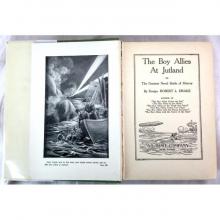 The Boy Allies with the Terror of the Seas; Or, The Last Shot of Submarine D-16
The Boy Allies with the Terror of the Seas; Or, The Last Shot of Submarine D-16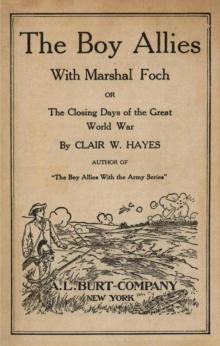 The Boy Allies on the North Sea Patrol
The Boy Allies on the North Sea Patrol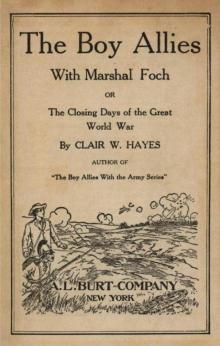 The Boy Allies in the Baltic; Or, Through Fields of Ice to Aid the Czar
The Boy Allies in the Baltic; Or, Through Fields of Ice to Aid the Czar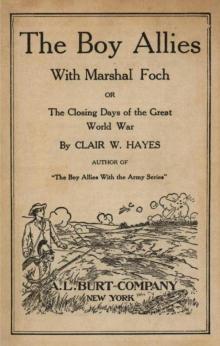 The Boy Allies with Marshal Foch; or, The Closing Days of the Great World War
The Boy Allies with Marshal Foch; or, The Closing Days of the Great World War Boy Allies with Haig in Flanders; Or, the Fighting Canadians of Vimy Ridge
Boy Allies with Haig in Flanders; Or, the Fighting Canadians of Vimy Ridge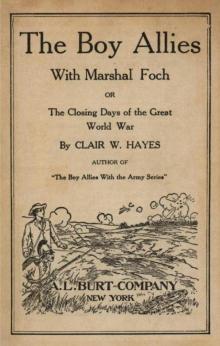 Boy Allies with the Victorious Fleets; Or, The Fall of the German Navy
Boy Allies with the Victorious Fleets; Or, The Fall of the German Navy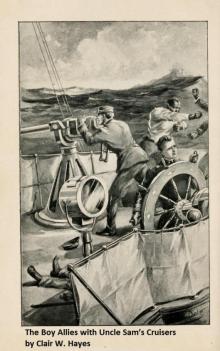 Boy Allies with Uncle Sam's Cruisers
Boy Allies with Uncle Sam's Cruisers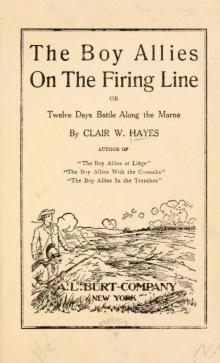 Boy Allies at Liège; Or, Through Lines of Steel
Boy Allies at Liège; Or, Through Lines of Steel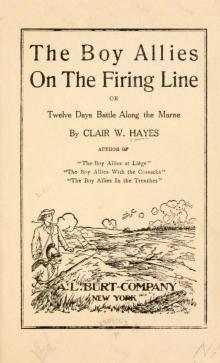 Boy Allies on the Firing Line; Or, Twelve Days Battle Along the Marne
Boy Allies on the Firing Line; Or, Twelve Days Battle Along the Marne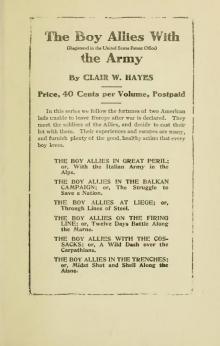 Boy Allies in the Balkan Campaign; Or, the Struggle to Save a Nation
Boy Allies in the Balkan Campaign; Or, the Struggle to Save a Nation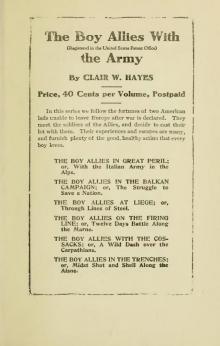 Boy Allies in the Trenches; Or, Midst Shot and Shell Along the Aisne
Boy Allies in the Trenches; Or, Midst Shot and Shell Along the Aisne Boy Artist.
Boy Artist.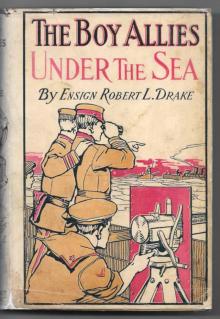 Boy Allies Under the Sea; Or, The Vanishing Submarines
Boy Allies Under the Sea; Or, The Vanishing Submarines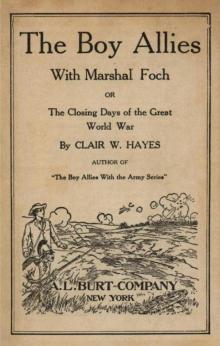 Boy Allies under Two Flags
Boy Allies under Two Flags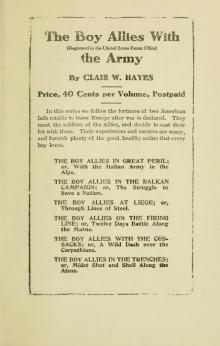 Boy Allies in Great Peril; Or, With the Italian Army in the Alps
Boy Allies in Great Peril; Or, With the Italian Army in the Alps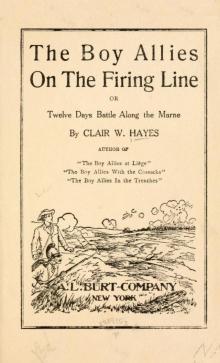 Boy Allies with the Cossacks; Or, A Wild Dash over the Carpathians
Boy Allies with the Cossacks; Or, A Wild Dash over the Carpathians